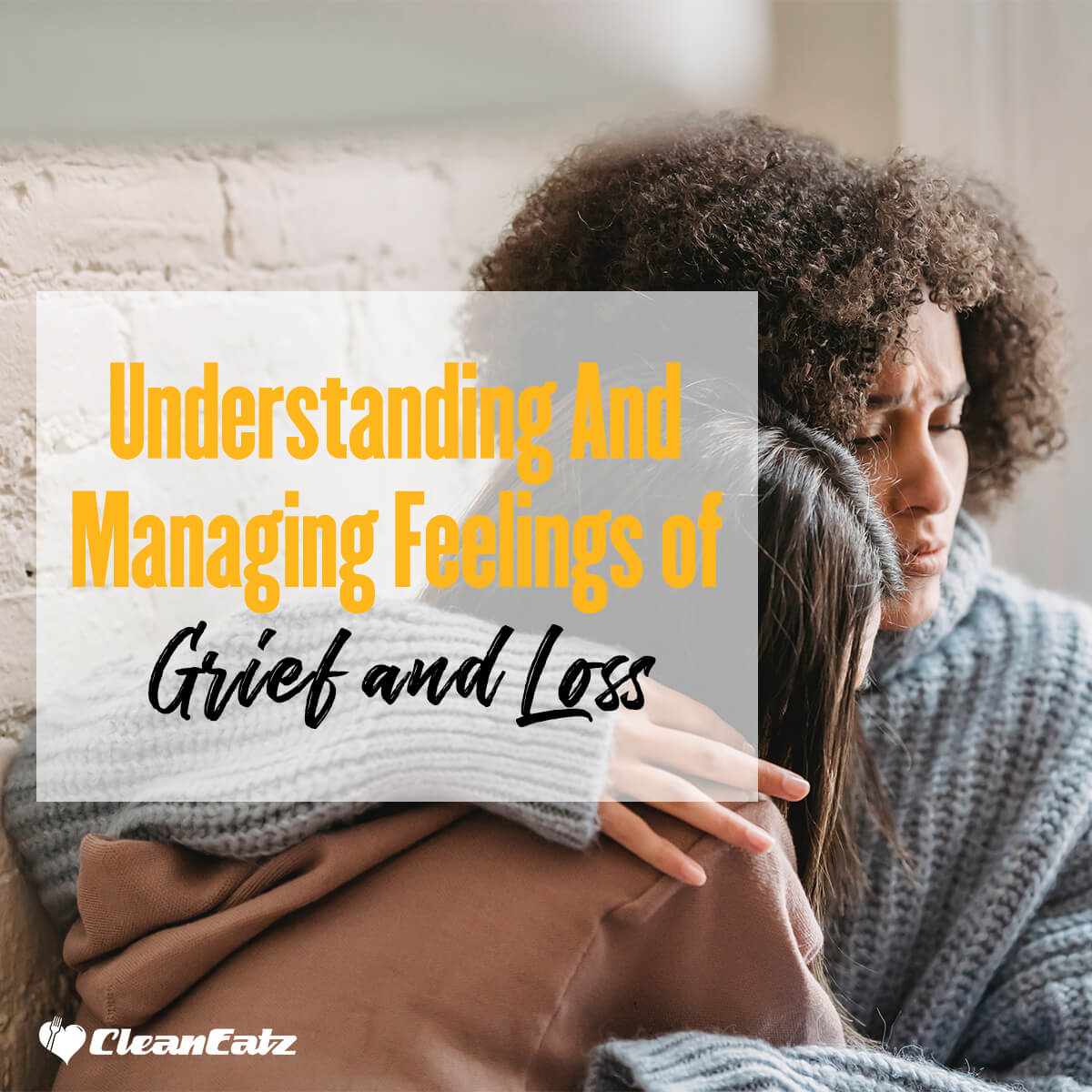
Managing Feelings And Stages of Grief and Loss
Jason Nista
Healthy Lifestyle
|
Mental Health
9 minute read
It's a universal truth: Everyone experiences grief and loss at some point in their lives. Whether it's due to the death of a loved one, the end of a relationship, or any other life event, we all need a way to cope with our emotions. But what is the best way to handle these feelings? Let's understand the stages of grief and loss
Grief and loss can feel overwhelming and paralyzing, but understanding your emotions is the first step in managing them. That’s where this essential guide comes in. Here, we'll explore different approaches to understanding grief and loss and provide actionable advice on how to find peace and move forward.
Together, we'll learn how to take control of our feelings, rather than allow them to control us—so let's get started!
What Is Grief?
Grief is a normal and natural reaction to loss. It's the emotional suffering you feel when something or someone you love is taken away. You might associate grief with the death of a loved one, but any loss can cause grief, including divorce or separation, a miscarriage, the loss of a job or income, or even the death of a beloved pet.
No matter what you're going through, it's important to remember that everyone's experience with grief is unique and there is no right or wrong way to cope. You might have all sorts of feelings like sadness, anger, guilt, longing, and even relief. You might also feel numbness and disconnection from your previous life. It's also common to find yourself constantly thinking about that person or thing you lost.
Symptoms of Grief and Loss
Grief and loss can manifest in a myriad of ways. Depending on the person and their circumstance, these feelings can range from mild to very intense. Some common symptoms of grief and loss include:
- Difficulty sleeping or concentrating
- Loss of appetite
- Physical symptoms such as fatigue, headaches, or chest pain
- Feeling overwhelmed by emotions such as sadness, guilt, or anger
- Withdrawal from friends and activities that once brought pleasure
- Feelings of disconnection or numbness
It's important to take your time to recognize these feelings, process them, and talk to your doctor if necessary in order to receive help. Remember that it is normal to feel overwhelmed by grief and loss; they are real emotions that deserve attention. With the right support system and resources, you can take steps toward healing.
Key Stages of Grief
Recognizing the stages of grief and loss is important for understanding how to handle the process of healing. Grief does not follow a linear path — rather it ebbs and flows like waves in a turbulent ocean. Different emotions can spark at different times and you may experience more than one emotion simultaneously.
The five major stages of grief and loss are as follows:
1. Denial: At this stage, you may initially be unaware or unwilling to accept the reality of your loss.
2. Anger: You may feel angry or frustrated with yourself, with others, or with the situation that has occurred due to your loss.
3. Bargaining: This stage is often associated with feelings of guilt or regret, and you may start asking yourself “what if?” and “if only” questions related to what could have been done differently.
4. Depression: This is the stage many people associate most closely with grieving as intense sadness may take over your thoughts and emotions during this period of time.
5. Acceptance: During this stage, you begin to understand that life will go on despite your loss and you can eventually envision a future where happiness will again become possible for you.
It’s important to keep in mind that the stages of grief are highly individualized processes—it can take varying amounts of time for different individuals to move through each stage depending on their own unique experiences and coping mechanisms.
Common Reactions to Loss
In addition to the stages of grief, there are also many common reactions to a loss that people experience. These can include:
- Physical symptoms: Grief can take a toll on your body, and you may experience physical symptoms such as fatigue, headaches, and changes in appetite.
- Emotional turmoil: You may experience a range of emotions, including sadness, anger, guilt, and anxiety. These feelings can be intense and overwhelming and can change rapidly.
- Cognitive changes: Grief can also affect your thoughts and beliefs. You may find yourself struggling with memory and concentration or having intrusive thoughts about the loss.
- Behavioral changes: Your behavior may also change as a result of your grief. You may withdraw from social activities, have trouble sleeping, or struggle with motivation.
Remember that these reactions are normal and natural and that it is okay to experience them as you move through the grieving process. It is important to be gentle with yourself and to seek support if you are struggling.
Coping Strategies for Grief and Loss
One crucial component of managing your grief is recognizing and utilizing coping strategies. When dealing with mourning, there are different levels you'll experience, from initial shock to eventual acceptance. During these stages, it's important to remember some key coping techniques so that you can stay focused on processing your feelings and moving on in the long run.
Identify Your Support System
First and foremost, you need to identify that support system. This could be family, friends, or even a therapist or support group. Being able to share your story and understanding the way others are feeling can be an incredibly powerful tool for overcoming grief. Someone who is not as directly connected to the situation may even be able to provide an outside perspective that proves helpful as well.
Express Yourself Creatively
Sometimes words can't do justice in expressing how you're feeling. Creative outlets such as writing, painting, playing music, or any form of art help allow you to express the feelings that come out of grief. It's also a great way to let out emotions in a healthy way since it is not only calming but can sometimes lead us toward finding closure with our loss.
Take Time for Yourself
Lastly, although sometimes it's hard to remember during times of mourning, taking time for yourself is vital for preserving mental health and well-being during times of grief and loss. Make sure you step away from stressful work or home environments and try activities like yoga or meditation at least once a week for self-care purposes even if it feels challenging at first - your mental health will thank you later!
Grief and loss are a part of life and one that can be overwhelming and hard to process. However, with the right understanding, support, and self-care, it is possible to move through grief and loss in a healthy and productive way. Everyone’s experience is unique, and it's important to remember that there is no single ‘right’ way to cope with grief and loss – there is no timeline or checklist that you need to follow.
Grief and loss can significantly impact your mental health, which is why you need to be aware of ways to regain your mental well-being. Having the right nutrition plan can do wonders for your mental health. This is where Clean Eatz Kitchen comes in! We offer a variety of some of the best meal plans to keep you at the top of your game.
The Role of Support and Community
Grief can be a lonely and isolating experience, but it is important to remember that you are not alone. Having a strong support system can provide comfort and help you move through the grieving process. Consider reaching out to friends, family, or a support group for help and support. You may also find comfort in religious or spiritual practices or by volunteering or giving back to others.
In addition to seeking support from others, it is also essential to maintain healthy relationships and avoid isolating yourself. Engaging in activities that you enjoy and spending time with people who bring you joy can help you find meaning and purpose, even in the face of loss.
Grief and loss can be difficult and overwhelming, but it is possible to find hope and healing in the face of these emotions, emphasizing the importance of self care. By understanding your grief, practicing self-care and self-compassion, seeking support and community, and finding ways to honor your loved one or loss, you can navigate this journey and emerge stronger and more resilient. Remember to be gentle with yourself and to take things one day at a time, highlighting the crucial importance of self-care during this process. You are not alone, and there is help available if you need it. Allow yourself the time and space to grieve, and know that a brighter tomorrow awaits.
Final Thoughts
Grief is an emotional feeling you suffer when losing someone or something you love. Common symptoms of grief include the inability to sleep, loss of appetite, fatigue, disconnection from friends and family, and more. Key stages of grief and loss include denial, anger, bargaining, depression, and acceptance. You can cope with grief by identifying your support group, expressing yourself, and taking time for yourself.
FAQ
Is it normal to feel guilty during the grieving process?
Yes, guilt is a common emotion in grief. Many people experience guilt about things they wish they had done differently or for feeling like they could have prevented the loss. It's important to work through these feelings with the help of a therapist or counselor.
Can children and teenagers also go through stages of grief?
Absolutely. Children and teenagers can experience grief and loss, and they may express their emotions differently than adults. It's crucial to provide them with age-appropriate support and resources.
How can I support someone who is grieving?
Offer your presence, empathy, and a listening ear. Avoid judgment and don't rush them through the grieving process. Be patient, and let them know you're there for them whenever they're ready to talk or seek support.
When should I seek professional help for grief and loss?
If your grief is overwhelming, long-lasting, or interfering with your daily life, it's advisable to seek professional help. A mental health counselor or therapist can provide guidance and support tailored to your specific needs.



